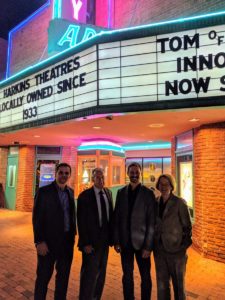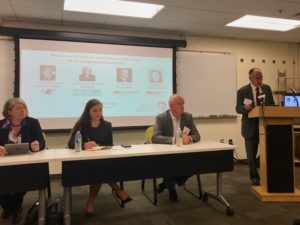 Photo Credit: Wes Herche
Photo Credit: Wes Herche
Arizona Event Recap: Resource Resiliency and National Security in a Changing Environment
ASP recently held a series of events in Arizona discussing the looming threat of climate change to Arizona’s national security and the importance of bolstering energy security to address that threat and build overall resiliency. ASP’s Lieutenant General Norm Seip, USAF (Ret) spoke with a broad range of stakeholders within the state, outlining the threat and opportunities to address the threat while simultaneously protecting our national security.
The program of events began at Davis-Monthan Air Force Base with a discussion between General Seip, previously the commander of the base, and currently active officers. General Seip opened with an overview of his experience in the military and the overreliance on fossil fuels. He highlighted how in Afghanistan and Iraq there were over 3,000 casualties related to the transportation and protection of fuel. Any improvements in energy efficiency or use of renewables is an opportunity to lower that number. In addition, he highlighted the efforts at Davis-Monthan to bolster base resiliency through their solar array. One of the Air Force’s largest solar arrays is at Davis-Monthan which is made up of 16.4 megawatt solar farm, enough energy to produce 40% of the base’s total power needs. The system helps save money and energy. After General Seip’s points, there was a lively discussion about the importance of the solar array for the base and the opportunities and challenges they see in the future for building base resiliency.

Photo Credit: Wes Herche, ASU
Following the base visit, General Seip participated in a panel discussion after a screening of the movie Tidewater, a film that outlines the threat of rising sea levels to Hampton Roads, Virginia and the 14 installations that span the region including Norfolk Naval Base. General Seip was joined by the Director of the Film, Roger Sorkin, and Kris Mayes, former Arizona Corporate Commission.
The next day began with a high-level overview of critical climate and sustainability issues in Arizona. General Seip provided insights from his experience as base commander at Davis-Monthan and overseas; specifically referencing how climate change and overdependence on fossil fuels impacted those operations. After the morning briefing, General Seip provided the keynote address for an event hosted by Arizona State University (ASU) titled, Resource Resiliency and National Security in a Changing Environment. The General was joined by the Honorable Sharon Burke, former Assistant Secretary of Defense for Operation Energy within the Obama Administration, Dr. Nadya Bliss, Director of Global Security Initiative at ASU, and Dr. Gary Dirks, Director of the Julie Ann Wrigley Global Institute of Sustainability at ASU for a panel discussion.
 General Seip’s opening remarks focused primarily on energy security and the threats and opportunities the United States and world faces. He began by outlining the difference between energy security and energy independence, the former critical and the latter neither feasible nor desirable, as explained in ASP’s latest fact sheet, Powering the Department of Defense. He highlighted how energy security means the U.S. must have assured access to energy and choices when it comes to energy source. Again, he reminded the audience that the U.S. lost 3,000 service members and contractors protecting fuel convoys in Iraq and Afghanistan alone. While he recognized that society will continue to depend on fossil fuels for the foreseeable future, to have a resilient military we must have options and renewable energy is a key component of that. He closed with a call to action that now is the time to “roll up our sleeves and get to work!”
General Seip’s opening remarks focused primarily on energy security and the threats and opportunities the United States and world faces. He began by outlining the difference between energy security and energy independence, the former critical and the latter neither feasible nor desirable, as explained in ASP’s latest fact sheet, Powering the Department of Defense. He highlighted how energy security means the U.S. must have assured access to energy and choices when it comes to energy source. Again, he reminded the audience that the U.S. lost 3,000 service members and contractors protecting fuel convoys in Iraq and Afghanistan alone. While he recognized that society will continue to depend on fossil fuels for the foreseeable future, to have a resilient military we must have options and renewable energy is a key component of that. He closed with a call to action that now is the time to “roll up our sleeves and get to work!”
The other panelists expanded on General Seip’s remarks. The Honorable Sharon Burke outlined the changes in energy usage within the military and how the usage is not only changing, but growing, with wars becoming increasingly energy intense. Yet at the same time, while the military needs to cut its huge energy footprint, it also is only 1% of total energy use. That leaves plenty of opportunities for “win-win” solutions in addressing climate change, security, and resiliency all at once. Dr. Nadya Bliss explained the growing research to identify causes of instability worldwide and how climate and energy is interconnected with many of those concerns. In addition, she noted that in order to truly solve these issues, there needs to be further collaboration between policy and science communities and even within the government itself. Dr. Gary Dirks closed the remarks by leveraging his experience working at British Petroleum. He mentioned that BP knew that climate change was going to be a threat to the world and their industry as early as the 1990s. Today, the whole industry is under pressure which is leading to innovative solutions and rapid expansion of renewables. He reminded the audience that the energy system has to (and will) change, creating incredible economic opportunities for those willing to step up and take those opportunities. The panel was followed by a Q&A session moderated by ASU’s Wes Herche.
The entire trip reiterated the importance of developing energy security, both to address the growing threats of climate change, but also to build the resiliency of the military and our entire nation. A transition to renewable energy is imminent and as General Seip noted, now is the time to “roll up our sleeves and get to work!”
Media Coverage:
- KTAR News: Experts discuss climate change, national security link at ASU event by Tom Perumean
- KJZZ: How Extreme Weather Events Can Impact U.S. National Security by Jorge Valencia
Additional Resources:
- Fact Sheet: Powering the Department of Defense
- Climate Change and Military Bases
- Congress Affirms Climate Change a Threat to Security – Asks for Military to Prepare





